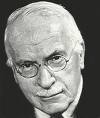Carl Gustav Jung 1875 - 1961
August 08, 2008
 Carl Gustav
Jung 1875 – 1961 was a
Swiss
psychiatrist, an
influential thinker and the founder of analytical
psychology.
Carl Gustav
Jung 1875 – 1961 was a
Swiss
psychiatrist, an
influential thinker and the founder of analytical
psychology.
Jung once wrote “…regarding homeopathy, you are quite right to see it as a continuation of alchemical practice” (C. G.;Adle Jung, Letters of C. G. Jung: Volume I, 1906-1950, (Taylor & Francis, 17 May 1973)) and ”I shall not commit the fashionable stupidity of regarding everything I cannot explain as a fraud,” (C.G. Jung, Jung on Synchronicity and the Paranormal, (Routledge, 7 Aug 1997). Page 57.).
Jung was a colleague of Emilii Karlovich Medtner, and Sigmund Freud. ** **
Jung believed that alchemy is a law of the psyche. Jung postulated that suggestibility, or psychic infection (or groupthink) underlies mass psychology.
Jung’s concept of synchronicity tears apart cause and effect and the rationality of scientific fundamentalism, thus ‘our world’ is phenomenological, not empirical.
Jung believed that the collective unconscious makes connections which represent statistical improbability to the order of 1:250,00 up to 1:289,023,876 (in Rhine experiments).
Jung explains that each Age has its ‘accepted language’ which becomes groupthink, but that it would be unwise to dismiss any ideas which when studied, obviously contain the wisdom of that Age. The language of a universal mind is common to all, no matter the language it is dressed in.
Edward Christopher Whitmont is not the only Jungian psychoanalyst to find that homeopathy and Jung’s perspective are completely synchronous. A simple Google search will reveal hundreds of such comparisons.
The mythical mentality underlying Jung’s perspectives echoes the work of Johann Wolfgang von Goethe and Paracelsus, and it is also reflected in the writings of Rudolf Steiner. This aspect of our lives is also essential to the philosophy of homeopathy. It is essential to our well being and our mental health. It has been called the Western Tradition of Mysticism, and as such it stands apart from dogmatism and fundamentalism, in essence, it is its apotheosis.
He emphasized understanding the psyche through exploring the worlds of dreams, art, mythology, world religion and philosophy. Although he was a theoretical psychologist and practicing clinician, much of his life’s work was spent exploring other realms, including Eastern and Western philosophy, alchemy, astrology, sociology, as well as literature and the arts.
His most notable ideas include the concept of archetypes, the collective unconscious and synchronicity.
Jung emphasized the importance of balance and harmony. He cautioned that modern people rely too heavily on science and logic and would benefit from integrating spirituality and appreciation of unconscious realms…
Jung’s work on himself and his patients convinced him that life has a spiritual purpose beyond material goals. Our main task, he believed, is to discover and fulfill our deep innate potential, much as the acorn contains the potential to become the oak, or the caterpillar to become the butterfly.
Based on his study of Christianity, Hinduism, Buddhism, Gnosticism, Taoism, and other traditions, Jung perceived that this journey of transformation is at the mystical heart of all religions.
It is a journey to meet the self and at the same time to meet the Divine.